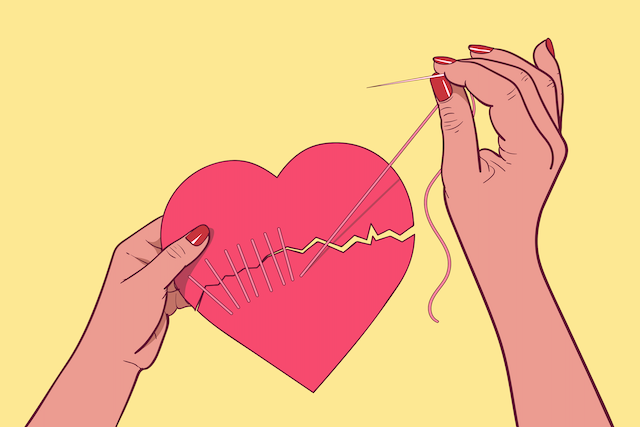It’s not easy to let go of hurt and betrayal. The pain can be acute and all-consuming, making it difficult to think about anything else. And yet, if we don’t find a way to deal with the hurt and betrayal, it can stay with us for years, affecting every aspect of our lives. In this article, we will explore what hurt and betrayal are, how they feel. And how to let go of hurt and betrayal. We will also hear from experts on the subject.
Contents
Understanding Hurt And Betrayal
Hurt and betrayal are two related but different things.
- Hurt refers to physical or emotional pain, such as the kind experienced by a person who has been abused or neglected.
- Betrayal is when someone betrays your trust in them, whether it’s by lying to you about something important or cheating on you with another person.
When someone hurts us, we often feel betrayed by them. When someone betrays us, it can hurt our feelings. Both hurt and betrayal are very painful experiences. They can leave you feeling angry, sad, and anxious about the future.
How It Feels Like

When you experience hurt and betrayal, it can feel like your world is crumbling around you. You may have trusted this person with something important in your life — perhaps even your heart — and now they’ve betrayed that trust by hurting or betraying you. If the person who hurt or betrayed you is also an intimate partner, then it can be even harder to deal with the pain and betrayal.
You may feel angry, sad, anxious about the future, or all three at once. The feelings of hurt and betrayal will likely last a long time — may be months or years — but they don’t have to dominate your life forever if you learn how to cope with them.
Types of Hurt And Betrayal
There are many different types of hurt and betrayal. The most common are:
Physical abuse: Being physically harmed by someone you love or trusts, such as a spouse, parent, sibling, friend, coworker, or boss. Physical abuse can include hitting, punching, slapping, kicking, throwing objects at the person, stalking them with a weapon, threatening violence, locking in a room.
Sexual abuse: Being forced into sexual acts by someone you love or trust, including rape, molestation, incest, exhibitionism, groping, fondling, unwanted touching, pressing for sex when one partner doesn’t want to.
Emotional abuse: Being constantly criticized, put-downs, name-calling, insults, shaming, threats of violence, gaslighting or isolation, silent treatment, ordering around the destruction of personal belongings, verbal abuse, ridiculing intimidating, stalking, following you everywhere.
Financial abuse: When someone controls your finances, preventing you from having access to money, or limiting what you can spend it on, making you ask for money or borrow it from them.
Letting Go Of Hurt And Betrayal

Hurt and betrayal can be hard experiences that leave us feeling angry and sad for a long time — even years after the event occurred. But if we cope with them healthily, then eventually they will fade away and no longer dominate our lives.
Self-help Tips
Here are some self-help tips to help you deal with hurt and betrayal:
Feel Your Pain
Give yourself time to be sad: It’s okay to feel sad after being hurt or betrayed. Allowing yourself to grieve the loss of the relationship is an important part of healing.
Write down your thoughts: Putting your feelings down on paper can also be helpful. It can help you process what happened, and it can be a nice way to look back on later.
Share Your Pain
Don’t bottle up your emotions: Suppressing your feelings is not healthy and will only make them worse. If you bottle up your emotions, they will eventually explode in an unhealthy way — like through lashing out at someone else or hurting yourself.
Talk about your feelings: Talking about what happened and how you feel can help manage your emotions. Find someone you trust — a friend, family member, therapist, or support group — and talk to them about what happened.
Get support: Surrounding yourself with supportive friends and family members can help you heal from hurt or betrayal. If you don’t have people in your life who are supportive of you, then it might be a good idea to get involved in some sort of support group or therapy.
Reflect On It
Learn from your mistakes: If there were things about yourself that contributed to being hurt or betrayed by another person, then it can be helpful to learn from those mistakes and make changes so they don’t happen again in the future.
Don’t blame yourself for what happened: It can be tempting to blame ourselves when we get hurt or betrayed by another person, but doing so is not healthy and won’t help you heal. Try to remember that the person who hurt or betrayed you is responsible for their actions, not you.
Move On, Move Past
Forgive: Forgiveness is a process that takes time, but it can be helpful for your mental health if you choose to forgive the person who hurt or betrayed you.
Be kind to yourself: Treating yourself with kindness and compassion can help you heal from hurt and betrayal. Be gentle with yourself, and let yourself feel whatever emotions come up.
Take care of yourself: Make sure to eat well, get enough sleep, and exercise regularly. These things will help you feel better physically and emotionally.
Where Can It Go Wrong
There are a few things that can make it difficult to let go of hurt and betrayal.
- One is if the person who hurt or betrayed you is someone close to you, such as a family member or intimate partner. The pain can be so intense that it feels impossible to move on from it.
- Another is if you don’t have a supportive network of friends or family members to lean on during this difficult time.
- Finally, some people have trouble letting go of hurt and betrayal. Because they feel like it’s their fault that the person betrayed them in some way — even though logically they know it isn’t.
If any of these factors are contributing to your inability to let go, then you may need professional help for healing to occur.
Why You Should Let It Go
Hurt and betrayal can lead to anger, sadness, anxiety about the future, and other negative emotions that affect your health well-being relationships work-life leisure time hobbies interests activities passions.
You may feel as though you’ll never be happy again, but let go of hurt and betrayal can help you move forward with your life.
When we hold onto a grudge or negative emotion from the past, it prevents us from enjoying our present. If someone has betrayed you in some way (e.g., by lying), then forgive them for the sake of your own mental and emotional health. It’s not easy to forgive someone who has hurt or betrayed you, but it is possible with time and patience.
NOTE: If you find that you are struggling to let go of the hurt and betrayal, then talking to a professional may be helpful for you. They can guide how best to move forward with your life.
Talking To a Professional

If you find that you are struggling to let go of the hurt and betrayal, then talking to a professional may be helpful for you. They can guide how best to move forward with your life.
However, there are a few things to keep in mind when talking to a professional about hurt and betrayal.
- First, it’s important to find someone with who you feel comfortable. You don’t want to talk to just anyone – make sure you find someone who understands what you’re going through and can help you get through it.
- Second, don’t be afraid to speak up about what you need from them for healing to occur. Some people may try and tell you that your feelings aren’t valid or important. But as long as they understand how much pain this has caused then they should be able to help you move on.
- Finally, therapy is not a quick fix. It takes time and effort to work through the pain of hurt and betrayal. However, it can be incredibly helpful for your mental health in the long run.
Therapy Options
Therapy is a great way to work through hurt and betrayal. There are many different types of therapy, but they all have one thing in common: they help you learn how to move on from what happened so that it doesn’t negatively affect your life anymore.
Cognitive-behavioral therapy (CBT)
Cognitive-behavioral therapy (CBT) focuses on the relationship between your thoughts, feelings, and behaviors. It helps you recognize negative thinking patterns so that you can change them into more positive ones.
Acceptance and commitment therapy (ACT)
Acceptance and commitment therapy (ACT) focuses on accepting what happened. Rather than trying to forget about it or bury your emotions deep down inside. This type of therapy also teaches skills for managing difficult situations with mindfulness techniques.
Dialectical behavior therapy (DBT)
Dialectical behavior therapy (DBT) teaches you how to regulate emotions. Like anger or sadness by using mindfulness techniques, distress tolerance skills, and interpersonal effectiveness skills.
This type of therapy helps people who may have trouble regulating their emotions. Due to past trauma or other issues in life that make it hard for them to cope with stressors as they arise.
Mindfulness-based stress reduction (MBSR)
Mindfulness-based stress reduction (MBSR) teaches people how to become more aware of their thoughts and feelings. While also learning coping skills that can be used in stressful situations or when emotions get too intense. It’s a type of therapy that focuses on mind-body connection rather than just talking about problems like in other therapies.
NOTE: These are just a few of the many different types of therapy that are available to help you work through hurt and betrayal. So if you’re feeling lost or stuck, then talking to a professional may be the best thing for you.
Case Study
John had been hurt and betrayed by his ex-boyfriend. He felt like he couldn’t go on living anymore. The pain was just too much to bear.
He decided to talk to a professional about it and they recommended cognitive-behavioral therapy (CBT).
The therapist helped John understand how his thoughts were affecting his feelings. And then showed him how he could change those thoughts into more positive ones so that he wouldn’t feel so sad all the time.
After a few months of working with his therapist, John felt much better about himself and was able to move on from what happened in the past without feeling like it would always haunt him.
The Key Message
If you’re struggling with hurt and betrayal, then don’t hesitate to reach out for help. Many different types of therapy can assist you in your healing journey. And remember, it takes time and effort but it is possible to move on from this type of pain.
Hearing From Experts
If you’re finding it difficult to let go of the hurt and betrayal, then hearing from experts may be a good way for you to start moving on. There are many different articles, podcasts, or videos that can help you understand what you’re going through and how to overcome it. Such as:
- The Betrayal Podcast: It’s a weekly podcast hosted by two women who were betrayed in their relationships. They speak candidly about what happened and how they’ve been able to move forward with life after such a devastating experience.
- Betrayal Trauma Recovery: The host interviews experts on topics related to betrayal trauma recovery, including relationship therapists, divorce attorneys, and more.
Experts’ Quote
“The first step in letting go is accepting the reality of what happened. Then we must work through our feelings of anger, sadness, and fear. And finally, we must forgive ourselves and the person who hurt us.” – Beverly Engel
Movies And Books
If you’re not quite ready to talk to a professional or hear from experts, then watching movies or reading books may be a good way for you to start the healing process. There are many different titles out there that deal with hurt and betrayal in various ways.
Some examples include:
The Betrayal Bond: Breaking Free of Exploitive Relationships. The author, Patrick Carnes, writes about how to identify and break free from relationships that are harmful or abusive.
How To Heal A Broken Heart In 30 Days Or Less: The author, Howard Bronson, writes about how to let go of hurt and betrayal. This book includes exercises you can do on your own or with a therapist to move forward with life after experiencing such an emotional event like this one.
Conclusion
It can be difficult to let go of hurt and betrayal. However, it is possible to move on from these experiences and live a happy life. There are many different types of therapy available to help you do this. You can also hear from experts to gain a better understanding of what you’re going through and how to overcome it. Finally, remember to forgive yourself and the person who hurt you. This is an important step on the road to healing. And remember, you are not alone in this process. There is help!
A Word From Therapy Mantra
Your mental health — Your psychological, emotional, and social well-being — has an impact on every aspect of your life. Positive mental health essentially allows you to effectively deal with life’s everyday challenges.
At TherapyMantra, we have a team of therapists who provide affordable online therapy to assist you with issues such as depression, anxiety, stress, workplace Issues, addiction, relationship, OCD, LGBTQ, and PTSD. You can book a free therapy or download our free Android or iOS app.


